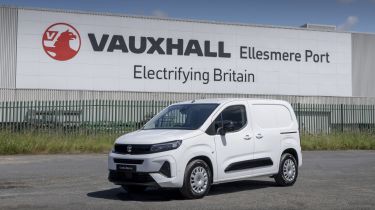Vauxhall could stop UK EV production due to ZEV mandate
Vauxhall’s parent company warns of “consequences” due to the UK’s tough ZEV mandate quotas, while the SMMT boss says car makers “have the stick, we just need the carrot”.

Vauxhall’s parent company, Stellantis, has admitted that tough conditions invoked by the UK’s ZEV mandate could force it to terminate production in the UK.
At the Society of Motor Manufacturers and Traders (SMMT) annual summit, Stellantis UK Managing Director, Maria Grazia Davino, told journalists that “there will be consequences” if the government does not offer any support to manufacturers in order to meet the ZEV mandate’s quota. This is currently set at 22 per cent for 2024, with the expectation that manufacturers will have to ensure that 80 per cent of their new car sales are of zero-emissions vehicles by 2030.
However, Davino explained that while the firm is prepared for such circumstances, a lack of any incentive or support would mean “Stellantis production in the UK could stop”.
Such a scenario would have far-reaching consequences; Stellantis opened its first-ever EV-only plant at Ellesmere Port last year, dedicated to the production of its fleet of electrified light commercial vans. Since then, the conglomerate which owns not only Vauxhall but Peugeot, Citroen, Jeep, Fiat and Alfa Romeo announced in February of this year that it plans to start building EVs at its Luton plant before the summer of next year. Nevertheless, Davino’s latest remarks put this entire project in jeopardy, with over 1,000 existing jobs on the line over at Ellesemere Port.
SMMT chief executive, Mike Hawes, suggested that the solution to accelerating the UK’s EV uptake and thus helping manufacturers fulfil tough ZEV mandate quotas is to introduce more incentives for consumers, describing how the industry “[has] the stick, we just need the carrot”.
With the general election looming and the polls predicting a large majority for the Labour Party, Hawes referred to the Labour manifesto, saying “potential governments are listening. Labour published a sector strategy for automotive in October last year, which contains a lot of what the industry wants.”
Still, Hawes called for stability and “a coalition of industry and government”, reiterating the SMMT’s appeals for a cut on VAT for public charging and potentially even that of private EV sales in order to boost uptake, the latter by as much as 300,000 EVs over the next three years.
In terms of the used market, Hawes told Auto Express that “it's important that [battery state of health] is standardised because you need to reassure consumers that there's consistency”.
Davino agreed, chiming that Stellantis has “[its] own standard, but we need a market standard that is then valuable for the customer. This goes beyond the technology; it’s also the confidence that we give to consumers about the usage and ownership of electric vehicles that [they] are safe, everything works and that you have no risk in owning and driving one, either if it's new or it's used.”
The SMMT says investment in the UK manufacturing sector could result in £50 billion of growth, suggesting that “smart” policies from the next government could see 17 million drivers switch to EVs by 2035.
Looking to sell your car? Our sister site Carwow has the fast and easy answer on our Sell My Car hub...







